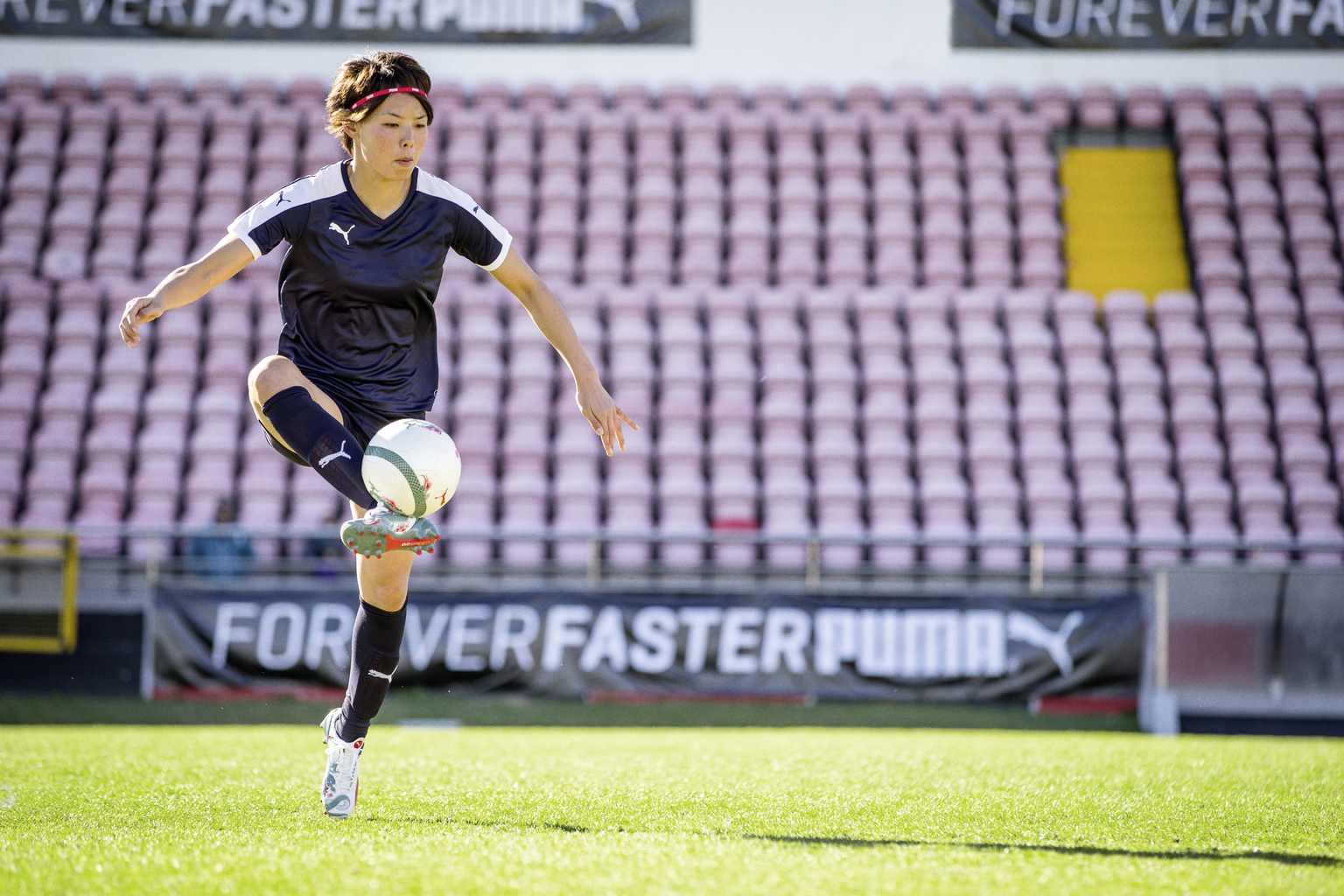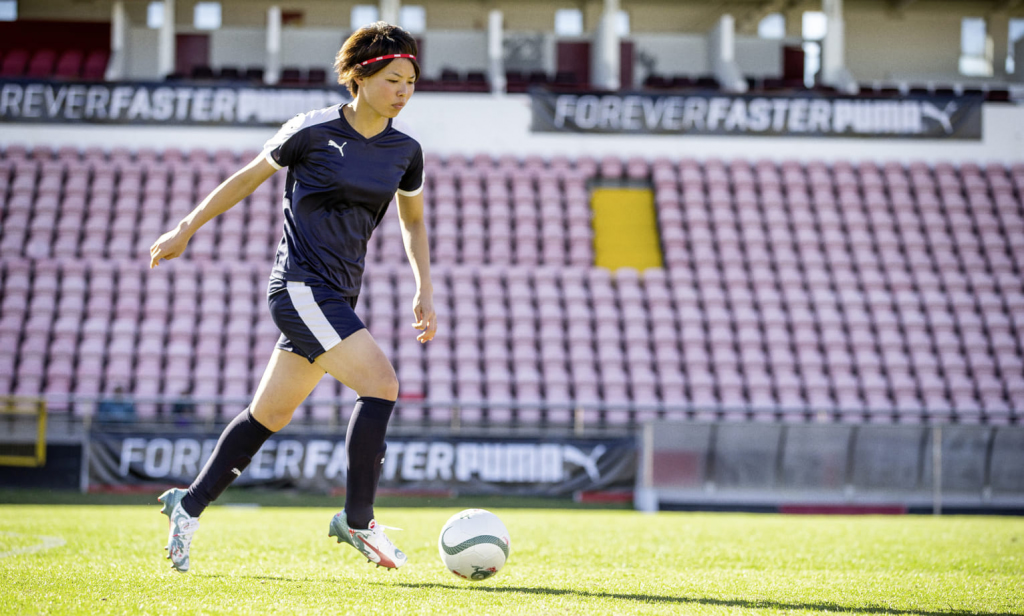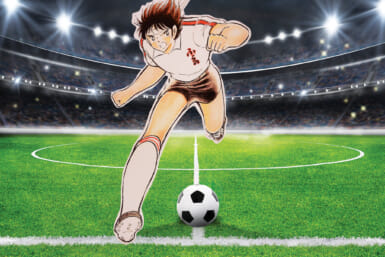Even though the Tokyo Olympics and Paralympics are officially postponed, we’re continuing our Meet the 2020 Athletes series.
Twenty-nine-year-old midfielder/defender Saki Kumagai has enjoyed a stellar career thus far, particularly at Lyon for whom she’s helped win four Champions League trophies, five domestic cups and six French titles.
At international level, she’s garnered more than 100 caps and in 2011 famously helped Japan lift the World Cup, scoring the winning penalty in the final against America. A year later, she was part of the Japanese squad that had to settle for silver at the London Olympics, narrowly losing 2-1 to the States in the final.
“I was in tears after that defeat,” Kumagai tells us. “Once the game finishes you’re not thinking about how far you’ve come. The only thing on your mind is the result. It was bitterly disappointing. Looking back now, though, I realize what a wonderful experience it was. There was just under 80,000 in the stadium. I’d never played in front of that many before. The noise was so deafening you couldn’t hear the instructions. It was a memorable occasion.”

Born in Sapporo in 1990, Kumagai started playing football in the third grade of elementary school when she became the only girl at a boys’ club. What started out as a bit of fun eventually became serious as she developed a real talent for the sport. While still in high school, she made her debut for the national team against Canada and then after graduating signed for Urawa Reds, winning the Nadeshiko League championship in her first season.
The success barely caused a ripple on these shores as the women’s game at the time garnered little attention. Things started to change following the country’s unexpected triumph at the 2011 World Cup in Germany with Japan becoming the first Asian side to win it. Just 20 at the time, Kumagai was a key member of the side’s defense, starting all six games in the tournament.
Her stature continued to grow as the competition progressed. She was particularly impressive during the last eight encounter against hosts Germany and then in the final against America where she held her nerve in the penalty shootout smashing the last spot kick past Hope Solo to seal the famous victory. Impressed by what they saw, Bundesliga side FFC Frankfurt snapped her up.
A year later Kumagai was once again in another major final for her country, this time at the 2012 Games in London. Despite missing out on gold, it was another fine tournament for Nadeshiko who conceded just two goals on their way to the final. After getting past a strong Brazil side in the quarters, they secured their first-ever Olympic medal with a tense 2-1 victory over France at Old Trafford.
“Those matches against Brazil and France were as tough as the final, obviously with a different outcome,” says Kumagai. “We put so much into those games and then ultimately you come face-to-face with America again. I was excited. I felt we could do it if we played in a similar way to the previous rounds.
“In the end it wasn’t to be and that was frustrating”
“In the end it wasn’t to be and that was frustrating,” continues Kumagai. “At the same time, I didn’t feel we were outfought by them. I remember in the changing room senior members of the squad telling us we should be proud of what we’d done. Until then I felt despondent and was crying, but hearing that left a big impression on me.”
Kumagai’s performances in London further enhanced the defender’s reputation and in 2013 she signed for Olympique Lyon, the top team in France who were also emerging as one of the best sides in Europe.
Though competition for places was tough, the Japanese international established herself in the starting eleven as a defensive midfielder. It was a new role, but one she had little trouble adapting to, with some comparing her performances to Barcelona’s Sergio Busquets. She describes the Spanish international as one of her footballing heroes along with former teammate Aya Miyama.
The latter captained Japan at the 2015 World Cup in Canada where Nadeshiko made it to the final again against the same opponents. However, unlike the previous two tightly contested encounters, this game was a cakewalk for the Americans who won it 5-2. It was a defensive horror show from Norio Sasaki’s ladies, but things were about to get worse the following year as defeats to Australia and China meant they missed out on the Rio Olympics.
“Those qualifying results changed the perception of the national team,” opines Kumagai. “We’d built up a strong reputation from previous tournaments, but after those games expectation levels decreased quite a bit. These huge tournaments don’t come around often so it was hard to take. The fact that I didn’t play in those matches made it even more disappointing.”
Though things weren’t going well for her country, Kumagai continued to thrive for club side Lyon. In the final of the 2015/16 Champions League final she scored the winning penalty as the French team triumphed over Wolfsburg. They would go on to win the next three continental titles while also dominating domestically. In 2019, the Sapporo-native was nominated as one of five contenders by the BBC for the World Player of the Year award.
An increasingly influential figure for Japan, she was given the captaincy by new coach Asako Takakura and led the team out at the most recent World Cup in France. After finishing second in their group behind England, they faced European Champions Holland in the second round. Despite what was arguably their best display at a major tournament since 2012, they lost the game 2-1 at the death thanks to a penalty by Lieke Martens after Kumagai was adjudged to have handled inside the box.
“After a loss like that you feel powerless”
“After a loss like that you feel powerless,” recalls Kumagai. “We gave it everything and it wasn’t good enough. That’s something we had to accept. It’s hard for all national teams to find a winning formula when you only get a short time together. I was sad at how we exited, but I thought we learned from the competition, particularly through our conflicts. Sometimes those internal disputes are necessary if you want to kick on as a squad.”
In their most recent tournament played in March, Nadeshiko lost all three of their games in the SheBelieves Cup to Spain, England and America. They need to vastly improve to have any chance of claiming a medal at the Olympics when it does go ahead. The US, who’ve won four World titles and four Olympic gold medals, will once again be strong favorites for the top prize in Tokyo.
“We’re not looking at any specific rivals,” says Kumaagai. “It’s an old footballing cliché but we need to just take each game as it comes, respecting all opponents. Our aim is to win the gold medal. To have any chance of that we need all the players in contention for the squad to be conscious of the way we play and constantly thinking about how we, as individuals, can effectively contribute to the team.”









